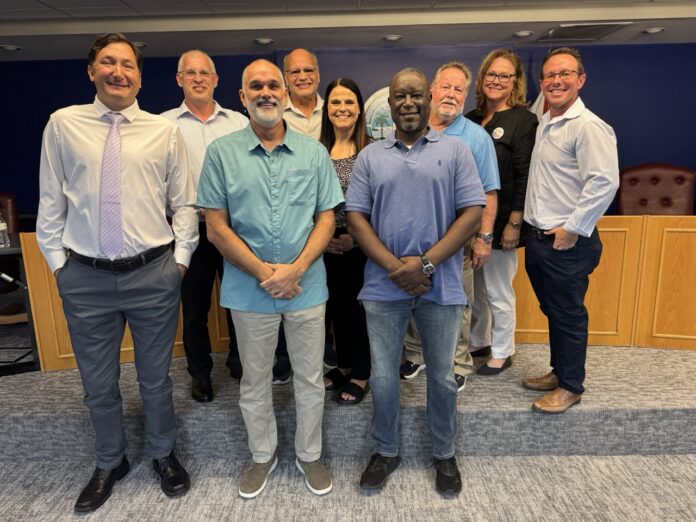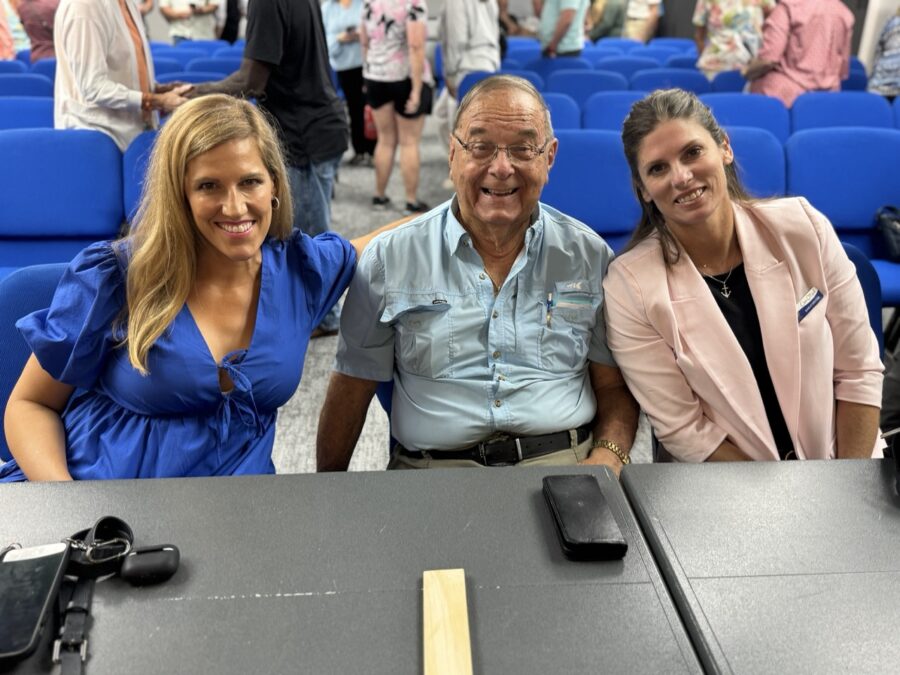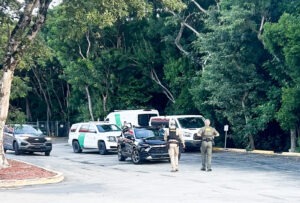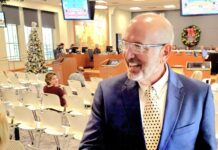
Candidates in the Middle Keys’ only local election for 2025 shared the dais for the first time on Oct. 1 as the Keys Weekly and Greater Marathon Chamber of Commerce hosted their annual political forum in the Monroe County BOCC chambers.
For nearly 90 minutes, incumbents and newcomers laid out their plans for Marathon if elected to one of the three open seats on the city council, from ideas to provide staff oversight to regulating city-sponsored nonprofit grants, balancing tax rates with resident services, code enforcement and, of course, differing views on affordable housing.
Candidates answered a round of eight identical questions prepared by the Weekly and Chamber of Commerce’s community affairs committee, with an additional round of questions individually addressing controversial aspects of each candidate’s campaign (printed below). The Weekly encourages all our readers to view the forum in its entirety by scanning the attached QR code. Additional forum answers will be printed in the Oct. 16, 23 and 30 issues of the Marathon Weekly.
Election day is Nov. 4. Vote-by-mail requests are due by 5 p.m. Oct. 23 at the Supervisor of Elections. Early voting takes place Oct. 20-31.
Answers reflect candidates’ views only, and not those of the Weekly or Chamber of Commerce. Answers are direct quotes from candidates, trimmed for length.
Gerrit Hale: Marathon has been one of the most aggressive governments in the Keys in encouraging affordable housing developments. Your campaign announcements posted potential solutions, but many of these are already in place. What new ideas do you have to address the affordable housing issue in Marathon?
I think they’ve been very aggressive, and they’ve done a great job. I know public-private partnerships get bantered around a lot, but when I worked on a public-private partnership, it was where you’ve got a government and you create a nonprofit. The nonprofit is the primary entity. Right now … (groups aren’t) really working together – it’s not cohesive. The plan I have includes the county and all the entities currently involved so that we’re all-inclusive to create long-term solutions, not just putting money in developers’ pockets and calling it affordable housing.
Greg Robinson: Other than purchasing a home, what other types of investments or commitments have you made in Marathon that display your dedication to the community?
Running for city council, for one. As all my running mates can attest to, this requires a lot of time, a lot of energy. Due to our unique situation with our son, I am back and forth between Jacksonville and here regularly, specifically to meet with residents to understand the challenges. Then I put my mind to what solutions we can practically implement, and I’ve put them on my website. I create actual solutions, and I intend on day one to bring resolutions so that we can improve our city.
Debbie Struyf: Marathon has been incredibly aggressive on affordable housing, with differences in opinion on what is effective. Your campaign materials have criticized larger developments, which seem to be the only projects that have actually been completed over the last few years. Given the unique challenges of building in the Keys, between land, construction costs and development rights, how would you as a council person implement your vision of “a responsible housing policy that keeps working families in Marathon?”
The only way to keep working families in Marathon is to find an affordable workforce housing program. We would have to partner with Habitat or someone like that. I will support any BPAS units to build single-family homes or deed-restricted homes that would allow a pathway to ownership for people who work here. I would support duplexes. I would support a townhouse community. I think cluster buildings are part of the problem we’re having now with our infrastructure.
David Perry: During an interview on U.S. 1 Radio two months ago, you referenced “corrupt people” working in City Hall. Is this a statement you still stand behind and if so, can you please provide concrete evidence of this corruption?
It is something I stand behind. I hate to bring this up, but it goes to the golf course and it doesn’t go to the golf course. I’ve seen things done out at that golf course that were illegal. They got violations from the state. Why did we have to call in the state if our city was doing their job? I don’t want to pick on the golf course, but I’ll just name one (item) that our own city engineer told me we have to do. When you build a property up four feet, you have to put a six-foot berm all the way around it. To this day, it still hasn’t been built. Why?

Jeff Smith: Comments you have made on the dais regarding city staff raises and contractor interactions have triggered strong responses from city staff and the Florida Keys Contractors Association. How can the council move forward with practical solutions on these issues in a manner that does not alienate constituents?
When it comes to the compensation survey, I took it on the chin my first year (on council). I believe we needed to have a formal process, assessments and a compensation survey done to get the proper data. We’ve accomplished all those things now. When it comes to the second comment (to the Contractors Association), we were in the middle of a discussion of trying to schedule a meeting to address complaints that then in the middle of budget season became 90 days before we could get a meeting. My comment was, hey, you have our emails. Send us your complaints so we can address them. I’ve yet to see an email from anybody.
Lynn Landry: In Marathon’s first public budget meetings, you expressed concern that meeting rollback would expose the city to the possibility of a large tax increase for 2026-27. By the next meeting, you agreed to meet the rollback rate. How do you reconcile this decision with concern over a large tax increase next year?
By simply looking at the data and listening to another council person on the dais lay it all out for us. If you look historically, we have been under budget. Last year, with a $374,000 deficit budget, we’re going to put over $1.1 million in reserves. So, it might have been a little bit of a misstatement from the dais, but when you go back and do the research, I don’t think it’s going to be as big a problem next year as I initially had thought.
Robyn Still: In reviewing a development on 107th Street, you exhibited a high level of scrutiny in contrast to previous development reviews that came before you. Please explain why this project elicited such a response and what the people of Marathon can expect moving forward if you are re-elected?
When I heard that that development was going to increase beyond what had already been approved, everything in me just screamed “no.” That was a small area, there’s a neighborhood that’s right there, and I just felt like the developers had already had been approved for an adequate number, and they just wanted more. It felt like they had gotten greedy, and they wanted more development. At that point, everything in me said that was not going to enhance the small-town feel.




















